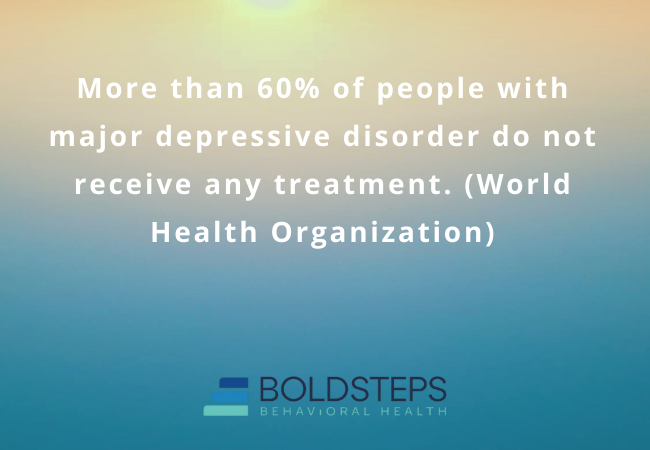Depression doesn’t always announce itself loudly. Sometimes, it quietly creeps into your life, gradually affecting your energy, relationships, productivity, and even your physical health. Too often, people dismiss their feelings as temporary sadness or stress, not realizing that they may be experiencing clinical depression — a treatable mental health condition.
At Bold Steps New Hampshire, we understand how hard it can be to recognize when it’s time to seek help. But knowing the early warning signs of depression, understanding how treatment works, and acting before symptoms worsen can make all the difference.
With services including our Depression Treatment Program New Hampshire, Partial Hospitalization Program New Hampshire, Intensive Outpatient Programs New Hampshire, and Virtual Treatment Program New Hampshire, we help individuals every day find hope and healing.
In this guide, we’ll walk you through:
– How to spot the warning signs of depression
– When to seek professional treatment
– What causes depression and the impact of untreated symptoms
– Effective treatment options available right here in New Hampshire
– How to sustain long-term mental wellness
Understanding Depression: A Complex but Treatable Condition
Depression is more than just “feeling down.” It’s a serious mental health disorder that affects every aspect of your life. The World Health Organization lists depression as the leading cause of disability worldwide, and in the United States alone, nearly 21 million adults experience a major depressive episode each year (NIMH).
The good news? Depression is highly treatable, especially when addressed early with professional care such as a Behavioral Health Treatment Center in New Hampshire.
What Causes Depression?
Depression doesn’t have a single cause — rather, it results from a combination of factors, including:
- Genetics: A family history of depression increases risk.
- Brain chemistry: Imbalances in neurotransmitters like serotonin and dopamine play a role.
- Trauma and life events: Loss, abuse, or major life changes can trigger depression.
- Chronic stress or illness: Long-term health issues can contribute.
- Substance use: Alcohol and drug misuse can worsen depressive symptoms. (Ask about our co-occurring support alongside our Depression Treatment Program.)
Understanding that depression is not a personal failing but a real medical condition can help reduce stigma and encourage seeking help.
Early Warning Signs of Depression
Recognizing depression early can prevent it from escalating into a crisis. Some signs are obvious, while others are more subtle.
Emotional Symptoms
- Persistent feelings of sadness, hopelessness, or emptiness
- Loss of interest in activities once enjoyed
- Feelings of worthlessness or excessive guilt
- Increased irritability or frustration over small matters
Physical Symptoms
- Fatigue and low energy, even after rest
- Significant weight loss or gain
- Changes in sleep patterns (insomnia or oversleeping)
- Slowed speech or physical movements
Cognitive Symptoms
- Trouble concentrating or making decisions
- Memory problems
- Indecisiveness
Behavioral Changes
- Withdrawal from friends and family
- Decline in work or school performance
- Use of alcohol or substances to numb feelings
- Self-harm or thoughts of death or suicide (If you notice these signs, seek immediate help.)
If you or someone you love is experiencing several of these symptoms for more than two weeks, it’s time to consider professional help at a trusted provider like Bold Steps New Hampshire.
The Impact of Untreated Depression
Left untreated, depression can severely impair daily life, leading to:
- Strained relationships
- Lost job opportunities or academic failure
- Substance misuse and dependence
- Worsening physical health (like chronic pain or heart disease)
- Increased risk of suicide
However, the sooner treatment begins, the better the outcomes. Early intervention through programs like our Partial Hospitalization Program New Hampshire or Intensive Outpatient Programs New Hampshire can significantly improve quality of life and prevent the condition from escalating.
When to Seek Help for Depression in New Hampshire
Many people delay getting help because they believe their symptoms aren’t “bad enough.” But the truth is, you don’t need to wait for a crisis to seek treatment.
Here’s when you should consider reaching out:
- Symptoms persist for more than two weeks
- Daily activities feel increasingly difficult or impossible
- You’re withdrawing from relationships and responsibilities
- You’re using substances to cope with emotions
- You experience co-occurring anxiety symptoms (Our center also offers Anxiety Disorder Treatment in New Hampshire)
- You’ve had past episodes of depression or other mental health conditions
- You’re experiencing thoughts of self-harm or suicide (Urgent intervention is critical.)
Our team at Bold Steps New Hampshire will guide you through a confidential assessment and recommend the level of care that’s right for you.
Depression Treatment Options at Bold Steps New Hampshire
At Bold Steps New Hampshire, we offer a full spectrum of services tailored to meet your unique needs. Whether you need structured day treatment or the flexibility of virtual care, we’ve got you covered.
1. Depression Treatment Program New Hampshire
Our dedicated program offers comprehensive care for depression, including psychiatric evaluation, medication management, individual therapy, and holistic approaches.
2. Partial Hospitalization Program New Hampshire
Ideal for individuals needing daily, intensive care without full-time hospitalization. PHP includes:
- Individual and group therapy
- Medication support
- Skills development (stress management, coping strategies)
- Family involvement sessions
- Access to holistic therapies
You attend treatment during the day and return home in the evening — perfect for those needing structure with some independence.
3. Intensive Outpatient Programs New Hampshire
IOP provides a step-down level of care, ideal for:
- Those transitioning from PHP
- People balancing work or family commitments
- Clients needing moderate support with increased flexibility
Sessions take place several times a week, focusing on ongoing recovery strategies and relapse prevention.
4. Outpatient Treatment Program New Hampshire
Best for individuals with mild to moderate depression or as continued support following PHP or IOP. Outpatient care offers:
- Individual therapy
- Medication monitoring
- Flexible scheduling to fit busy lifestyles
5. Virtual Treatment Program New Hampshire
Life happens, and we understand. Our Virtual Treatment Program offers telehealth sessions so you can receive quality care from the comfort of home. Ideal for:
- Busy professionals
- Parents with caregiving responsibilities
- Those with transportation barriers
All programs are overseen by our expert clinical team at our Behavioral Health Treatment Center in New Hampshire.
How PHP and IOP Specifically Help with Depression
Partial Hospitalization Program (PHP):
PHP provides structured, intensive treatment while still allowing clients to live at home. The routine and daily therapeutic support can help:
- Stabilize severe depressive symptoms
- Provide immediate crisis management
- Offer peer support and connection
- Develop healthier coping mechanisms
- Engage families in the recovery process
Intensive Outpatient Program (IOP):
IOP is excellent for continued progress or less severe depression, helping clients:
- Reinforce coping skills learned in PHP
- Maintain work and family responsibilities
- Build long-term resilience and relapse prevention strategies
Sustaining Mental Wellness After Treatment
Recovery from depression is a journey, not a destination. Even after treatment, ongoing support is vital.
At Bold Steps New Hampshire, we help clients:
- Create relapse prevention plans
- Maintain medication management and therapy check-ins
- Connect with support groups and community resources
- Utilize our Virtual Treatment Program for ongoing flexibility
- Engage in family therapy to strengthen home support networks
Our goal is to empower you with skills and strategies that support lasting mental health and happiness.
Why Choose Bold Steps New Hampshire?
When you choose Bold Steps New Hampshire, you’re choosing a team that is deeply committed to your healing. We are proud to offer:
- Compassionate, licensed mental health professionals
- A full range of care levels, from Virtual Treatment Programs to PHP and IOP
- Specialized programs for depression, anxiety, and co-occurring disorders
- A supportive, stigma-free environment
- Personalized care plans for every client
At our Behavioral Health Treatment Center in New Hampshire, you’ll find more than treatment — you’ll find hope.
Conclusion
If you or a loved one is struggling with depression, remember: you don’t have to go through this alone.
Depression is treatable, and with the right support, recovery is possible.
Call Bold Steps New Hampshire today at (603) 915-4223 to schedule your confidential assessment. Our expert team will help you explore your options, whether you need our Depression Treatment Program New Hampshire, Partial Hospitalization Program New Hampshire, Intensive Outpatient Programs New Hampshire, or Virtual Treatment Program New Hampshire. Your next chapter starts with one bold step. Take it today — and let us walk with you on the path to healing.
FAQ on Signs of Depression
What are the early warning signs of depression?
Early signs of depression include persistent sadness, fatigue, changes in sleep or appetite, irritability, difficulty concentrating, and withdrawal from activities you once enjoyed. If these symptoms last longer than two weeks, it’s time to seek professional help.
When should I seek professional treatment for depression?
You should seek help if:
-
Symptoms last more than two weeks
-
Daily activities become difficult
-
You experience thoughts of self-harm or suicide
-
You’re using alcohol or substances to cope
-
You have co-occurring anxiety symptoms (Ask about our Anxiety Disorder Treatment in New Hampshire.)
What treatment options are available for depression in New Hampshire?
At Bold Steps New Hampshire, we offer:
Each program is tailored to your unique needs and recovery goals.
What is a Partial Hospitalization Program (PHP) for depression?
PHP is a structured, intensive day-treatment program offering therapy, medication management, and peer support without requiring overnight stays. It’s ideal for those needing daily support but who can return home in the evenings.
How does an Intensive Outpatient Program (IOP) help with depression?
IOP offers flexible, part-time treatment involving several therapy sessions per week. It’s perfect for individuals transitioning from PHP or those balancing work, family, or school commitments while receiving professional support.
Can I get treatment for depression from home?
Yes! Our Virtual Treatment Program New Hampshire offers confidential, HIPAA-compliant online therapy and medication management, ideal for busy schedules or transportation challenges.
What if I have both depression and anxiety?
Many people experience both depression and anxiety. At Bold Steps New Hampshire, we offer integrated dual diagnosis treatment, addressing both conditions simultaneously for more effective recovery.

